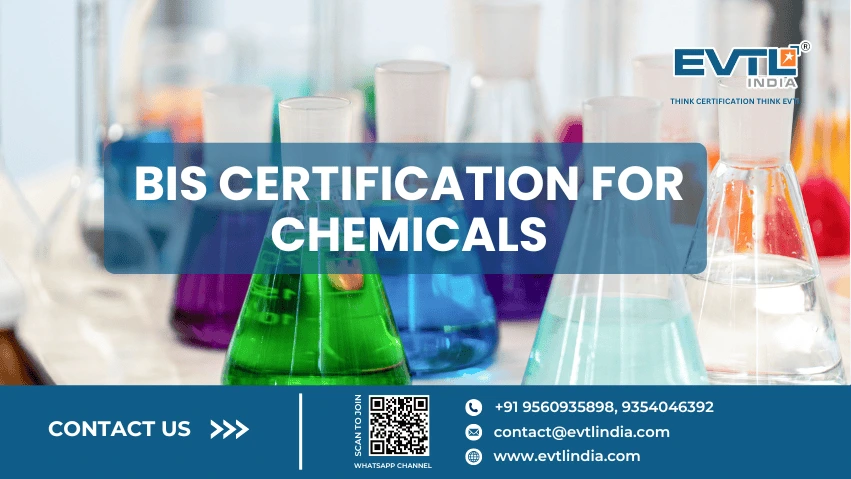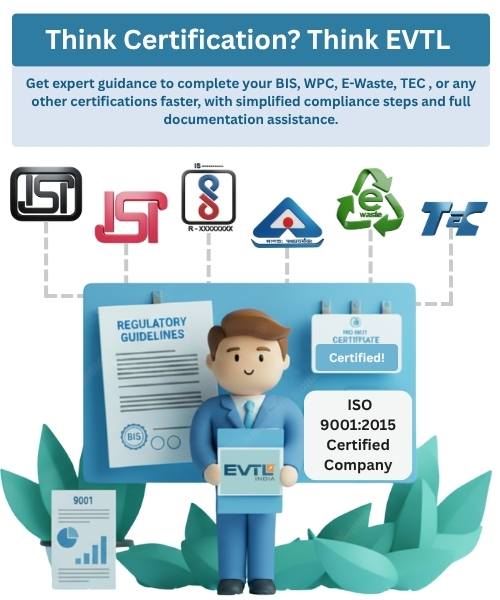Get A Quote
BIS Certification for Chemicals

Introduction
to BIS Certification for Chemicals
The Bureau of Indian Standards (BIS) is India's national body responsible for setting standards and conducting quality assessments for various products, including chemicals. BIS certification is mandatory for a wide range of products in India, as it helps to ensure product quality, safety, and compliance with Indian standards. In the case of chemicals, obtaining BIS certification, also known as the ISI (Indian Standards Institute) mark, is not only a mark of quality but a legal requirement for certain chemicals to be manufactured, sold, or imported into India.
The
Importance of BIS Certification in the Chemical Industry
The chemical industry is integral to various sectors, including pharmaceuticals, agriculture, textiles, and manufacturing. Chemicals are often the building blocks for a wide range of products, making their quality and safety paramount. BIS certification ensures that chemicals meet stringent safety standards, preventing potential hazards associated with substandard or contaminated products. This certification helps manufacturers assure their customers and regulatory bodies of their commitment to quality and safety.
Regulatory
Framework for BIS Certification of Chemicals
To safeguard public health and ensure that only high-quality chemicals are available in the market, the Indian government has implemented strict regulations. The Ministry of Chemicals and Fertilizers (Department of Chemicals and Petrochemicals) introduced various Quality Control Orders (QCOs) for chemicals that mandate manufacturers to obtain BIS certification (ISI Mark) for their products to manufacture and sell in the Indian market. Any person who contravenes the provisions of this order shall be punishable under the provisions of the said Act. These Quality Control Orders identify specific chemicals that must comply with Indian standards, emphasizing the critical role BIS plays in regulating chemical quality.
Types
of Chemicals Requiring BIS Certification
Several categories of chemicals fall under
mandatory BIS certification due to their wide usage and potential risks. These
include:
● Industrial Chemicals: Chemicals used in
manufacturing processes, such as caustic soda, acetic acid, and various
industrial solvents.
● Organic Chemicals: Compounds derived
from organic sources, including methanol, phenol, and formaldehyde.
● Inorganic Chemicals: Such as
hydrochloric acid, sulphuric acid, and sodium bicarbonate.
● Petrochemicals: Chemicals derived from
petroleum and natural gas, used in plastics, resins, and synthetic fibers.
Mandatory
Chemicals Under BIS Certification
The Ministry of Chemicals and Fertilizers periodically issues Quality Control Orders to update the list of chemicals that require mandatory BIS certification. These QCOs are published in the Gazette of India, specifying the chemicals, the relevant Indian standards, and the deadlines for compliance. Manufacturers must stay updated with these orders to ensure they adhere to the latest regulatory requirements.
Process of BIS Certification for Chemicals
To get BIS certification for chemicals,
manufacturers must follow a detailed and rigorous process. Below are the key
steps:
1.
Understanding Applicable Indian Standards: Before
starting the certification process, manufacturers need to identify the applicable
Indian standards relevant to their chemical products. BIS has specific
standards for each chemical, covering various quality and safety aspects.
2.
Product Testing and Analysis: The chemical product
must undergo thorough testing in a BIS-recognized laboratory to ensure
compliance with the relevant Indian standards. This step is crucial to
determine if the product meets all technical requirements for safety, purity,
and quality.
3.
Documentation and Application Submission: The
manufacturer must compile all necessary documents, including product
specifications, manufacturing details, safety data sheets, and test reports.
These documents are submitted through the official BIS portal.
4.
Inspection and Factory Assessment: BIS officials
may conduct an on-site inspection of the manufacturing facility. This
assessment includes reviewing the production processes, raw materials, quality
control systems, and storage facilities to verify compliance with BIS
standards.
5. License Granting and ISI Mark Usage: If the product and manufacturing facility pass the inspection and meet all requirements, BIS grants a license to use the ISI mark. This license allows the manufacturer to legally produce and sell the chemical in the Indian market under BIS certification.
Challenges
Faced During BIS Certification
While BIS certification is essential for
quality assurance, it can pose challenges, particularly for small and
medium-sized manufacturers. Some of the common hurdles include:
● Complex Documentation: The paperwork
involved can be overwhelming, with strict requirements for technical details,
safety standards, and product specifications.
●Cost of Compliance: Testing fees,
laboratory analysis, application costs, and inspection fees can add up, making
certification an expensive affair.
● Time-Consuming Process: The BIS
certification process involves multiple steps, each requiring careful attention
and coordination, which can lead to delays if not managed properly.
● Technical Expertise: Understanding and meeting the technical standards set by BIS requires a high level of expertise, which smaller manufacturers may lack.
Benefits
of BIS Certification for Chemicals
Despite the challenges, obtaining BIS
certification offers numerous advantages for manufacturers and consumers:
● Market Access: BIS certification is
mandatory for selling certain chemicals in India, opening up a vast domestic
market for certified products.
● Quality Assurance: The ISI mark is a
symbol of trust, ensuring consumers that the product adheres to rigorous safety
and quality standards.
● Regulatory Compliance: Manufacturers
with BIS certification meet Indian regulatory requirements, avoiding legal
penalties and ensuring smooth operations.
● Export Opportunities: BIS certification
can enhance the reputation of chemical products in international markets, as it
is recognized as a mark of quality compliance.
● Competitive Edge: A BIS-certified product stands out from uncertified competitors, making it more attractive to consumers and industry buyers.
Role
of Laboratories in BIS Certification for Chemicals
Certified laboratories play a critical role in the BIS certification process. They are responsible for conducting impartial and accurate testing to ensure that chemical products meet the required standards. These laboratories must be approved by BIS to maintain high standards of quality and reliability.
BIS
Certification Renewal and Maintenance
BIS certification is not a one-time
process; it requires continuous compliance. Manufacturers must renew their
certification periodically to continue using the ISI mark. The renewal process
involves:
● Re-testing the Product: Ensuring that
the product still meets the updated BIS standards.
● Factory Inspections: Conducted
periodically to verify ongoing compliance with manufacturing standards.
● Fee Payment: Manufacturers must pay regulatory fees for renewal and maintenance.
Impact
of Non-Compliance with BIS Certification
Failure to comply with BIS certification requirements can have serious consequences. Non-compliant manufacturers face legal actions, including fines, product recalls, and potential bans on selling their products in the Indian market. These penalties underscore the importance of adhering to BIS standards for safety, quality, and legal compliance.
Case
Studies: Successful BIS Certification in the Chemical Industry
Many manufacturers have successfully navigated the BIS certification process, demonstrating the importance of quality compliance. For example, companies producing industrial chemicals like acetic acid and sodium hydroxide have leveraged BIS certification to gain a foothold in the Indian market, ensuring that their products are safe, reliable, and meet all legal standards.
Common
Pitfalls in BIS Certification and How to Avoid Them
Manufacturers often face setbacks during
the certification process. Common pitfalls include incomplete documentation,
inadequate testing, and lack of technical expertise. To avoid these issues,
manufacturers should:
● Engage with Experts: Seek professional
guidance to ensure all documentation is complete and accurate.
● Conduct Pre-Testing: Perform internal
testing before submitting samples to BIS-recognized laboratories.
● Maintain Quality Control: Implement strict quality control measures in production to align with BIS standards.
Conclusion
Navigating the BIS certification process can be challenging, especially for small and medium-sized enterprises. EVTL India is a leading consultancy firm dedicated to assisting manufacturers in obtaining BIS certification (ISI Mark) efficiently. With expertise in managing BIS portal submissions, documentation, and regulatory fees, EVTL India ensures a smooth and successful certification process. By choosing EVTL India, manufacturers can enhance their product's marketability both in India and internationally, securing a competitive edge. Additionally, EVTL India provides ongoing support post-certification, helping manufacturers maintain compliance with BIS standards and renew their licenses as needed.
Frequently Asked Questions (FAQ)
1. What is BIS certification, and why is it
important for chemicals?
BIS certification, represented by the
ISI mark, is a mandatory certification that ensures chemical products meet
Indian safety and quality standards. It is essential because it protects consumers
from hazardous or substandard chemicals, ensures regulatory compliance, and
enhances the product's credibility in the market.
2. Which chemicals require mandatory BIS
certification in India?
The Ministry of Chemicals and
Fertilizers, through Quality Control Orders, has identified specific chemicals
that require mandatory BIS certification. These typically include industrial
chemicals, organic and inorganic compounds, and petrochemicals like caustic
soda, methanol, formaldehyde, and hydrochloric acid. The exact chemicals are
listed in the latest QCOs issued by the government.
3. What are the consequences of not having BIS
certification for chemicals?
Manufacturers who fail to obtain BIS
certification for regulated chemicals cannot legally produce, sell, or import
these products in India. Non-compliance can lead to penalties, including fines,
product bans, and legal action. Ensuring BIS certification helps avoid these
risks and maintains a manufacturer's reputation and market access.
4. How long does it take to get BIS certification
for chemicals?
The BIS certification process timeline
varies based on factors such as product complexity, documentation quality, and
laboratory testing duration. On average, it can take several weeks to a few
months to complete the process, including testing, documentation submission,
and factory inspection. Engaging with professional consultancy services like
EVTL India can expedite the procedure.
5. Can BIS certification be renewed, and what
does the renewal process involve?
Yes, BIS certification needs to be
renewed periodically to ensure ongoing compliance. The renewal process involves
re-testing the product according to updated standards, undergoing factory
inspections, and paying the necessary regulatory fees. Manufacturers must keep
track of expiration dates to avoid disruptions in their certification status.
You can contact us via email at contact@evtlindia.com or by phone at 9560935898. Feel free to get in touch with us anytime for the support you need.
BIS ISI Mark Certification | BIS-CRS Certification | EPR E-WASTE | WMI Registration | BIS Certification For Footwear | TAC & IMEI Registration | BIS FMCS Page | TEC | EPR Registration for Plastic Waste Management | EPR Registration for Battery Waste Management | EPR Registration For Used Oil | EPR Registration for Tyre Waste Management | WPC ETA License | NOC | LMPC | Legal Metrology | Trademark Registration | ISO Certification | EMI-EMC Test | Toys | GEM Registration | EPCG Scheme | LM 79 & LM 80 | ROHS Approval | CDSCO Registration | RF Testing | IP Rating Test | MSME & NSIC Registration | BIS Certificate for Conformity | BIS Scheme-X Certification | Hallmark Registration | Laboratory Recognition Scheme | ECO-MARK Certification | RDSO | CE Certification | List Of Equipments | US FDA Registration | Lab Setup & Lab Equipment |
Free Call Back
Why Choose EVTL INDIA
Expertise in Indian Regulatory Standards
End-to-End Support
Trusted by Top Indian & Global Brands
Fast Processing & Transparent Pricing
Strong Liaison with Indian Authorities
Company Profile



















